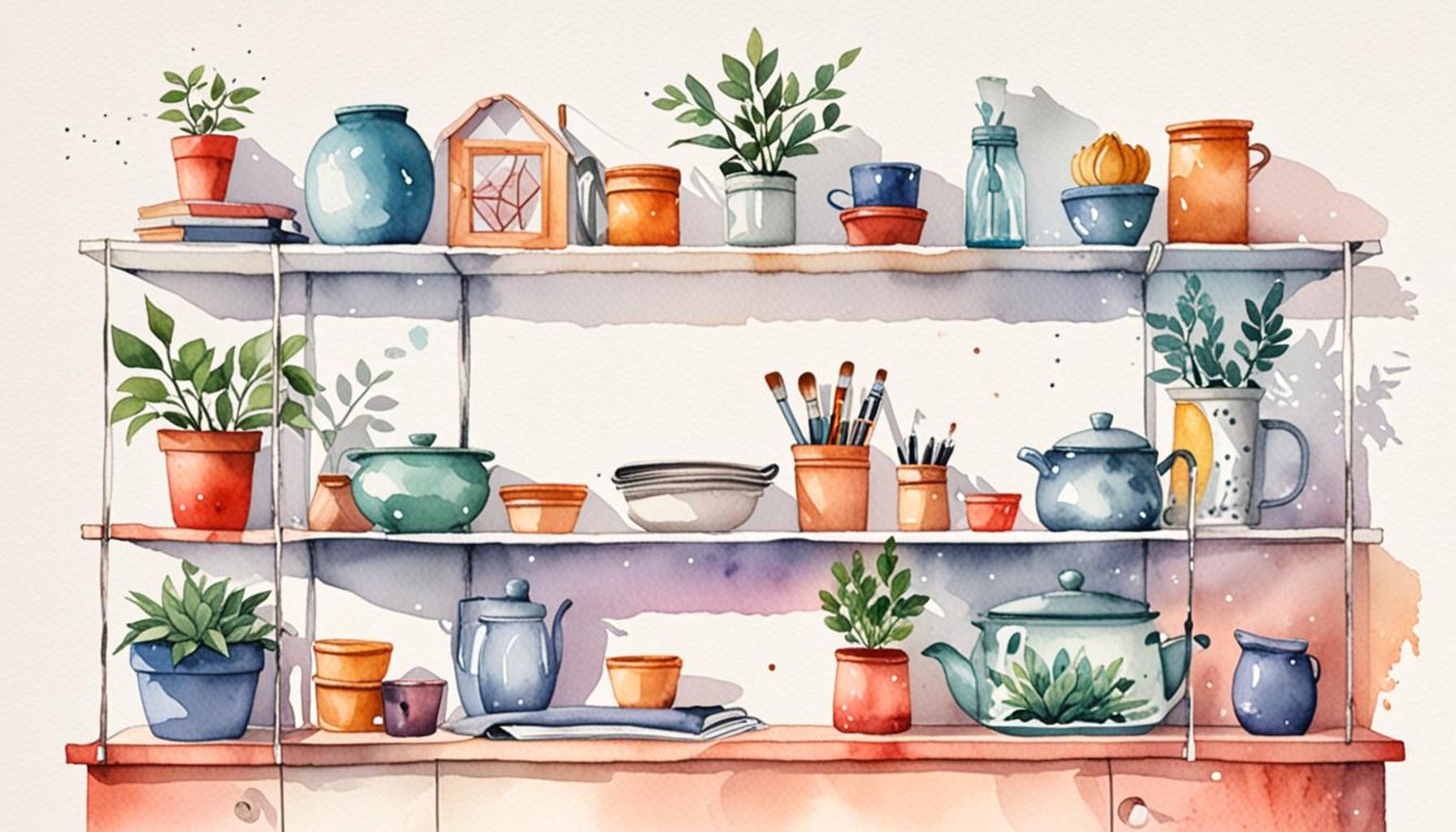The Role of Decluttering in Mental Health: Finding Clarity and Peace Through Personal Organization

Exploring the Transformative Benefits of Decluttering
In our fast-paced lives, clutter often accumulates both physically and mentally. This buildup can lead to a feeling of overwhelm, making it challenging to focus on what truly matters. The chaos of everyday life, especially in vibrant urban areas of Nigeria like Lagos or Abuja, can exacerbate this clutter, filling our homes and minds with stress and distraction. A simple yet effective solution lies in the act of decluttering.
Decluttering transcends mere tidying up; it can significantly enhance mental well-being. By embracing personal organization, individuals can experience:
- Increased clarity in thoughts and decision-making, allowing for better focus on personal and professional goals.
- Reduced anxiety from a chaotic environment, which is essential when the external world can often feel overwhelmingly chaotic.
- Enhanced productivity through a more conducive workspace, leading to higher efficiency in daily tasks.
Research supports the idea that our surroundings impact our mental state. Psychological studies suggest that organized spaces foster a sense of control, leading to improved mood and overall health. Indeed, a study conducted by psychology experts found that individuals working in organized environments report lower levels of stress and higher levels of satisfaction compared to those in cluttered settings. In the context of Nigeria, where urban living can be bustling and frenetic, the importance of creating a peaceful home environment cannot be overstated. Imagine the tranquility one can foster with a simple yet conscious effort to organize.
Additionally, decluttering encourages a deeper connection with oneself. The process prompts individuals to evaluate their belongings, leading to a reflection on their true priorities and values. For instance, consider the clothes stuffed in the back of a wardrobe. By choosing to keep only what is truly cherished, one not only frees up physical space but also emotional space. Decluttering can serve as a powerful pathway to self-discovery, allowing individuals to shed distractions and focus on what truly resonates with their identity.
Moreover, the social and cultural expectations prevalent in Nigerian society often lead to the accumulation of items that may not serve any purpose. Items inherited from family members or gifts can weigh heavily on one’s space and mind. By letting go of such obligations, individuals reclaim their personal space and the peace that comes with it.

As one embarks on this journey to reclaim peace and clarity, it is essential to recognize the steps towards personal organization can vary significantly from simple sorting sessions to engaging professional organizers. Consider starting with room-by-room assessments, implementing storage solutions that reflect personal aesthetics, or even hosting a community swap event in local neighborhoods. Each small step taken opens the door to a more fulfilling life.
Ultimately, embracing the transformative power of decluttering not only enhances mental health but also leads to a greater understanding of oneself and one’s surroundings. It is an invitation to explore how a well-organized space can elevate your mental health and contribute to a richer, more meaningful existence.
YOU MAY ALSO LIKE: Read read another article
Understanding the Psychological Impact of Clutter
As the modern world continuously expands, the interplay between our surroundings and mental health becomes increasingly significant. When it comes to clutter, its effects reach far beyond a disorganized space. Clutter in our homes, offices, and even in our digital lives can infiltrate our minds, leading to increased feelings of anxiety and stress. In the context of vibrant Nigerian cities such as Lagos and Abuja, where the hustle and bustle can already feel overwhelming, the importance of tackling clutter is accentuated.
The act of decluttering does not merely create a visually appealing space; it fundamentally alters our mental framework. Research indicates that the brain can become overstimulated when surrounded by disarray, affecting our ability to concentrate and process information effectively. Individuals often report feeling a sense of relief and enhanced calmness after clearing out areas that contribute to their stress.
To better understand the profound relationship between mental health and decluttering, consider the following benefits:
- Enhanced Focus: A clean and organized space allows for improved concentration, cutting down on the distractions that clutter naturally brings.
- Improved Mood: Engaging in decluttering activities can trigger the release of dopamine, the feel-good hormone, which can uplift spirits and reduce feelings of anxiety.
- A Sense of Control: By deciding what to keep or discard, individuals can cultivate a sense of empowerment and control over their environment and, by extension, their lives.
- Boosted Creativity: An organized space fosters a clearer mind, inviting innovative thoughts and ideas to flow freely.
In Nigerian culture, where familial ties and respect for inherited items often lead to the accumulation of possessions, the emotional weight associated with such items cannot be overlooked. While these items may hold sentimental value, they can also serve as mental anchors, making it difficult to move forward. The process of decluttering thus becomes a healing journey—a chance to reflect on what truly matters and to make space for new experiences and memories.
More than just a task, decluttering can be viewed as a pathway to self-empowerment. As individuals sift through their belongings, they confront their attachments and priorities. This practice not only clears physical space but also paves the way for introspection and self-growth, crucial aspects of maintaining positive mental health.
Furthermore, organizing one’s space cultivates mindfulness. In a society where the pace of life often overshadows self-care, the act of decluttering encourages moments of reflection and presence. This mindfulness fosters peace, creating a sanctuary amidst the external chaos of urban living.
As the journey of decluttering unfolds, it brings not only clarity but also peace, resonating deeply with the core of one’s identity. Cultivating an organized environment is more than just aesthetics; it is about embracing the potential for mental well-being and enriching one’s life experience.
In examining the role of decluttering in mental health, it is crucial to consider the psychological implications of a disorganized environment. Surrounded by clutter, many individuals report feelings of stress and anxiety. This reaction is not merely anecdotal; studies have shown that clutter can activate the brain’s fight or flight response, leading to chronic stress. Another significant aspect involves the concept of visual overload. The more clutter we encounter, the harder it becomes for our brains to focus. Research suggests that a chaotic space distracts us from our ability to concentrate, making it challenging to complete tasks efficiently. For many, decluttering is not just about tidying up; it becomes a vital pathway towards achieving mental clarity and focus, enhancing overall productivity.By taking steps to organize our spaces, we can cultivate a sanctuary of tranquility. As we clear out unnecessary items, we also clear out mental clutter, which can provide a sense of accomplishment and control. This process can trigger the release of dopamine, a chemical in the brain associated with feelings of pleasure and satisfaction. Furthermore, a well-organized environment fosters a sense of peace and stability. For individuals managing anxiety or depression, creating an orderly space can serve as an act of self-care. It allows for an environment that promotes mindfulness and encourages individuals to be present in their space. By restructuring personal environments, one can elicit profound changes in how they feel both physically and emotionally.This journey towards decluttering is not solely about the physical act of organizing; it’s a transformative process that can lead to personal growth and a healthier mindset. Engaging in decluttering can inspire individuals to reassess their priorities and foster a sense of purpose and efficacy in their daily lives. As more people recognize these connections, the ripple effect of advocating for organized living becomes more apparent in both individual mental health and the broader community context. Understanding the importance of decluttering is vital, and individuals interested in enhancing their mental well-being can explore practical strategies for beginning their own journey towards a more organized and peaceful life. Embracing this practice offers a unique opportunity for wealthier mental landscapes and healthier living spaces, paving the way for a more harmonious existence.
RECOMMENDED: Check out this similar article
The Therapeutic Process of Decluttering
Decluttering transcends mere tidying; it serves as a profound, therapeutic process that heavily influences our mental health and overall well-being. This practice provides a form of emotional release, allowing individuals to let go of attachments that no longer serve them. In Nigeria, where the tradition of holding onto possessions can be particularly strong, embracing decluttering as a therapeutic tool can be both liberating and transformative.
Have you ever experienced the overwhelming sensation of navigating through heaps of clothes, outdated electronics, or mementos from past relationships? This mental clutter can impede progress in various areas of life. Decluttering allows individuals to confront these emotional hurdles head-on. Engaging in this process can trigger cathartic moments that evoke a sense of relief, leading to enhanced mental clarity and emotional resilience.
Moreover, studies indicate that physical disorder can often lead to a cascade of psychological challenges, such as depression and anxiety. According to research conducted by the American Psychological Association, individuals who regularly engage in decluttering report significantly lower levels of stress and improved overall mood. This phenomenon can be particularly pertinent for urban dwellers in cities like Ibadan and Port Harcourt, where rapid urbanization often results in chaotic environments.
Decluttering can also function as a form of mindfulness practice. It requires individuals to focus on the present moment, which can effectively ground them amidst the chaos of daily life. Instead of being consumed by external distractions, this focused activity promotes an introspective state, allowing individuals to assess their belongings and decide what to retain. By creating an environment of organization, one can cultivate a tranquil mental state, even in bustling settings.
Community-oriented practice is also a significant element within Nigerian culture that enhances the benefits of decluttering. Organizing local decluttering events, whether at community centers or within neighborhoods, fosters a sense of unity. Engaging in collective decluttering not only rids individuals of unwanted possessions but also strengthens social bonds. This communal effort can have remarkable effects on participants’ mental health, leading to feelings of belonging and support. For instance, charities and local initiatives often welcome donations, providing a sense of purpose and renewal for both the giver and the receiver.
Pioneering works in the field of psychology are unveiling the potential for decluttering to serve as a form of therapy. Researchers have found that decluttering can help alleviate symptoms of PTSD and bring about a more balanced emotional state. The act of sorting through possessions can allow individuals to confront past traumas, thereby releasing pent-up emotions connected to these items.
Beyond emotional weight, the long-term benefits of decluttering can also yield practical advantages. Studies show that organized spaces can enhance productivity, allowing individuals to achieve their personal and professional goals with improved efficiency. This is particularly vital for young professionals in cities like Lagos, where competition is fierce, and maximizing one’s productivity can make all the difference.
The integration of decluttering into various facets of life, including work and personal endeavors, underscores its importance as a tool for promoting better mental health. From fostering social connections to reframing one’s emotional landscape, the multifaceted nature of decluttering showcases its potential to create a dynamic shift towards positive well-being.
CHECK OUT: Click here to explore more
Embracing Decluttering for a Healthier Mind
In conclusion, the practice of decluttering plays a vital role in enhancing mental health and fostering emotional clarity, especially within the context of Nigerian culture, where attachments to possessions can often become burdensome. As examined, the therapeutic aspects of decluttering facilitate emotional release and serve as a powerful tool to confront psychological challenges such as anxiety and depression. By creating an organized environment, individuals not only achieve a sense of peace but also pave the way for improved productivity, essential for thriving in competitive urban settings across Nigeria.
Moreover, the act of decluttering transcends individual benefit, extending into the community by fostering social bonds through collective organization efforts. As residents come together to declutter, they not only alleviate personal stressors but also strengthen ties, cultivating a sense of belonging that is crucial for community well-being. Participating in events that promote sharing and donating further amplifies this sense of purpose and renewal.
The ongoing research into decluttering as a therapeutic method highlights its potential to help individuals manage past traumas and develop emotional resilience. As this practice continues to gain recognition, it becomes increasingly clear that decluttering is not merely a lifestyle choice but a transformative pathway toward mental wellness. To achieve a more fulfilling life, one needs to embrace this journey of self-discovery and organization, making room not just in our physical spaces, but also in our minds for clarity, peace, and a healthier outlook on life.


